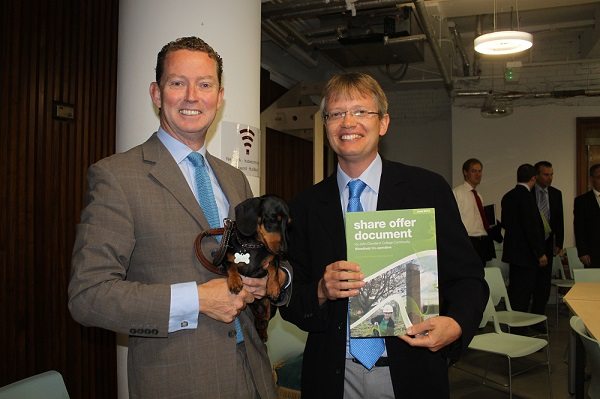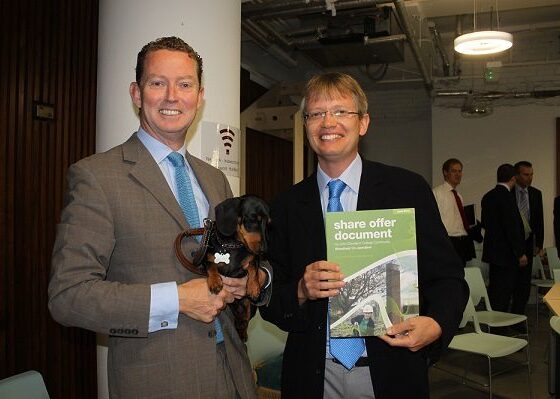

Energy
JCC Community Woodheat Co-operative: a school saying no to an oil-based future
Blue & Green Tomorrow’s core aim is to encourage readers to buy from, and invest in, businesses that balance the needs of the planet, its people and all of our prosperity. One such organisation is John Cleveland College (JCC) Community Woodheat Co-operative.
Investors are being invited to buy shares in the co-operative, which is the UK’s first community-owned school biomass project.
Blue & Green Tomorrow caught up with the people behind JCC Community Woodheat Co-operative to find out more.
What is JCC Community Woodheat Co-op?
It is the UK’s first community owned, large-scale biomass school project.
JCC Community Woodheat Co-op was established to replace the old oil-fired boilers with biomass heating at John Cleveland College in Leicestershire, through a community share offer. It provides the platform to raise the capital needed through a public share offer, allowing the community to own and operate the boilers.
John Cleveland College is a large academy for 1,700 students aged 14-19. The college has Specialist Science status and is keen to link the development of renewables on site into their curriculum.
What problem is JCC Community Woodhead Co-op uniquely solving?
The college is currently heated by oil and spends £150,000 per year on heating bills. The woodchip boiler will save over £30,000 per year, which is funding that can be ploughed back into teaching, as well as over 250 tonnes of carbon dioxide a year.
The project will support the local wood-fuel economy, with fuel sourced from the new National Forest just 12 miles away. This will help support jobs in the area for 20 years – the lifetime of the project.
It will also be used by the Educational Funding Agency as a template for other schools in the UK – so we’re revolutionising the way schools get their energy and reducing their dependency on fossil fuels.
Why do you do what you do? What are your drivers or inspirations?
The JCC Community Woodheat Co-op was set up by a collaboration of three not-for-profit organisations: Green Fox Community Energy Co-operative, Transition Leicester and Sharenergy.
All three organisations are driven by the desire to reduce the impact we have on the environment and are committed to finding solutions that involve the local community. We’re taking a responsible attitude to tackling climate change and helping the government meet its targets for renewable heat generation.
Why should people invest in the company, either through Ethex or direct?
JCC Community Woodheat Co-op is a great ethical investment. It is the start of the community energy revolution in the UK and it will help the college replace its oil guzzling heating system with a state of the art woodchip-fired boiler.
A return of 9% averaged over 20 years makes a fantastic long-term investment. Investors’ capital will start to be paid back from year three, allowing the money to be reinvested through the project’s lifetime.
Investing is simple and quick through our on-line portals: Ethex and Microgenius.
What will the investment help you to do? And what will investors get out of it?
The investment will allow the co-operative to purchase and install the boilers and investors will become members of the co-operative, with equal voting rights.
 The project will also provide an environmental community fund which will aim to further reduce carbon dioxide emissions around the college. Members of the co-op will decide how the funds should be distributed.
The project will also provide an environmental community fund which will aim to further reduce carbon dioxide emissions around the college. Members of the co-op will decide how the funds should be distributed.
John Cleveland College’s principal, Paul Craven, says, “If you decide to invest you will have a real stake in a project that will bring lasting social, environmental and economic benefits to the college, its students and the wider community.”
If you’re interested in investing in JCC Community Woodheat Co-op, you can do so through Ethex.
Further reading:
Ethex: empowering education into ethical investment
Sustainability at the heart of food and agriculture
Rob Hopkins: Transition Towns is the only ethically defensible thing to do


 Environment11 months ago
Environment11 months agoAre Polymer Banknotes: an Eco-Friendly Trend or a Groundswell?

 Features10 months ago
Features10 months agoEco-Friendly Cryptocurrencies: Sustainable Investment Choices

 Features11 months ago
Features11 months agoEco-Friendly Crypto Traders Must Find the Right Exchange

 Energy10 months ago
Energy10 months agoThe Growing Role of Solar Panels in Ireland’s Energy Future





























